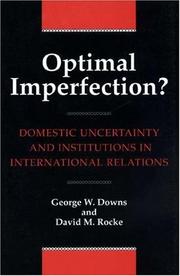| Listing 1 - 3 of 3 |
Sort by
|
Book
Year: 2008 Publisher: Washington, D.C., The World Bank,
Abstract | Keywords | Export | Availability | Bookmark
 Loading...
Loading...Choose an application
- Reference Manager
- EndNote
- RefWorks (Direct export to RefWorks)
Joseph E. Stiglitz, 2001 Nobel Laureate in Economics, helped create the theory of markets with asymmetric information and was one of the founders of modern development economics. He played a leading role in an intellectual revolution that changed the characterization of a market economy. In the new paradigm, the price system only imperfectly solves the information problem of scarcity because of the many other information problems that arise in the economy: the selection over hidden characteristics, the provision of incentives for hidden behaviors and for innovation, and the coordination of choices over institutions.
Adverse Selection --- Debt Markets --- Development Economics --- Economic Theory --- Economic Theory and Research --- Economics --- Efficient Outcomes --- Finance and Financial Sector Development --- Financial Intermediation --- Imperfect Information --- Incentive Problems --- Innovation --- Labor Policies --- Macroeconomics and Economic Growth --- Market Economy --- Markets and Market Access --- Perfect Information --- Social Protections and Labor
Book
Year: 2008 Publisher: Washington, D.C., The World Bank,
Abstract | Keywords | Export | Availability | Bookmark
 Loading...
Loading...Choose an application
- Reference Manager
- EndNote
- RefWorks (Direct export to RefWorks)
Joseph E. Stiglitz, 2001 Nobel Laureate in Economics, helped create the theory of markets with asymmetric information and was one of the founders of modern development economics. He played a leading role in an intellectual revolution that changed the characterization of a market economy. In the new paradigm, the price system only imperfectly solves the information problem of scarcity because of the many other information problems that arise in the economy: the selection over hidden characteristics, the provision of incentives for hidden behaviors and for innovation, and the coordination of choices over institutions.
Adverse Selection --- Debt Markets --- Development Economics --- Economic Theory --- Economic Theory and Research --- Economics --- Efficient Outcomes --- Finance and Financial Sector Development --- Financial Intermediation --- Imperfect Information --- Incentive Problems --- Innovation --- Labor Policies --- Macroeconomics and Economic Growth --- Market Economy --- Markets and Market Access --- Perfect Information --- Social Protections and Labor

ISBN: 0691225206 0691044600 Year: 1996 Publisher: Princeton, N.J. : Princeton University Press,
Abstract | Keywords | Export | Availability | Bookmark
 Loading...
Loading...Choose an application
- Reference Manager
- EndNote
- RefWorks (Direct export to RefWorks)
"Domestic politics matters" has become a rallying cry for international relations scholars over the past decade, yet the question still remains: Just how does it matter? In this book, George Downs and David Rocke argue that an important part of the international impact of domestic politics springs from the institutional responses to its many uncertainties. This impact is due not so much to the errors in judgment these uncertainties can cause as to the strategic and institutional consequences of knowing that such errors are possible. The heart of the book is its formal analysis of how three kinds of domestic uncertainty have shaped international relations through their influence on three very different institutions. One chapter deals with the decision rules that citizens create to cope with uncertainty about the quality of their representation, and how these can lead to the paradoxical "gambling for resurrection" effect. Another chapter describes the extent to which the weak enforcement provisions of GATT can be understood as a mechanism to cope with uncertain but intermittent interest group demands for protection. The third chapter looks at the impact of uncertainty on the creation, survival, and membership of multilateral regulatory institutions, such as the Montreal Protocol and EU, when some states question the capacity of other states to meet their treaty obligations.
GATT. --- Theory. --- EU. --- Domestic politics. --- International politics. --- Abreu, Dilip. --- Adventurism. --- Asymmetric information. --- Balance of Power. --- Bargaining costs. --- Bayesian learning. --- Bilateral agreement. --- Brinkmanship. --- Capability. --- Capacity change. --- Certainty effect. --- Chief executive. --- Compensation. --- Compliance. --- Contraction. --- Coordination regime. --- Cournot equilibrium. --- Democracy. --- Deterrence. --- Diversionary war. --- Domino effect. --- Election sanction. --- Enforcement. --- Environmental regulation. --- Equilibrium refinements. --- Fearon, Jame. --- Fundamental attribution bias. --- Gambling for resurrection. --- Gibbons, Robert. --- Glorious Revolution. --- Haas, Peter. --- Hegemonic stability game. --- Humes, Brian. --- Imperfect information. --- Information uncertainty. --- Institutionalist tradition. --- Interest groups. --- Jervis, Robert. --- Kahneman, Daniel. --- Kreps, David. --- Lafay, Jean-Dominique. --- Loss aversion. --- Median voter. --- Multilateral agreement. --- Multilateral institution. --- Multipolarity. --- New economics of organization. --- Nontariff barriers. --- Osborne, Martin. --- Pareto-suboptimal solutions. --- Perfect information. --- Preventive wars. --- Protectionism.
| Listing 1 - 3 of 3 |
Sort by
|

 Search
Search Feedback
Feedback About
About Help
Help News
News